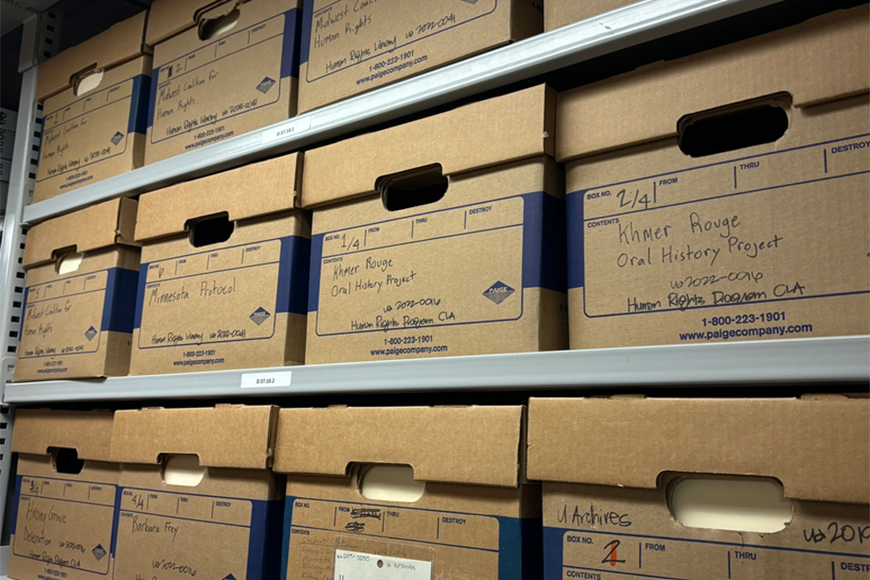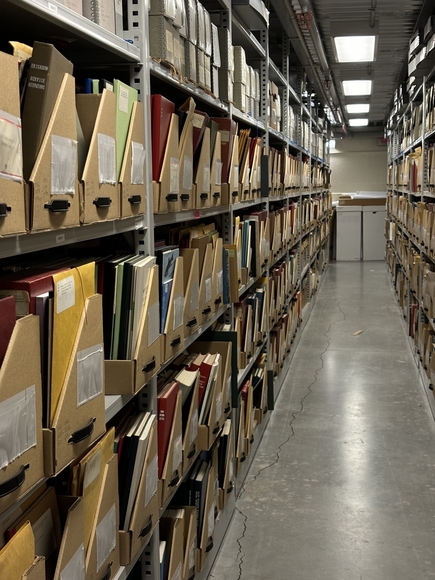Minnesota Human Rights Archive

What is the Minnesota Human Rights Archive (MHRA)?
The Minnesota Human Rights Archive (MHRA) is a new initiative for acquiring and preserving the collections of key human rights actors for future generations. Housed in Elmer L. Andersen Library on the University of Minnesota Twin Cities campus, the Archive brings together the history of Minnesota’s human rights organizations and advocates, and includes materials from the humanities, social sciences, legal, medical, and public policy fields.
Its purpose is to inspire, educate, and empower human rights defenders and scholars. Human rights activists and scholars, historians, political scientists, sociologists, legal scholars, and journalists will find paper records, oral histories, audio/visual materials, electronic records, and websites among the archive’s collection.
Materials in the archive also cover human rights advocacy at the United Nations, the history of international nongovernmental organizations in Minnesota, fair trial rights, business and human rights, the rights of noncitizens, and historical human rights conditions in countries around the world.
A Unique Home for Minnesota’s Human Rights History

The MHRA is an interdisciplinary collection, an “umbrella archive” composed of new human rights materials donated to the University of Minnesota Libraries, as well as existing materials housed in the Archive and Special Collections (ASC). The Archive continues to acquire new materials and update its database as collections are organized and described.
Kris Keisling, director of ASC, believes that “There’s very little in ASC that doesn’t somehow connect to the Human Rights Archive.”
The MHRA uses a human rights framework to reexamine pre-existing collections of the ASC, positioning itself as a researcher separated from the bounds of a singular collection. It encompasses materials from a variety of collections such as the Social Welfare History Archives, the Tretter Collection in Gay, Lesbian, Bisexual and Transgender Studies, the Givens Collection of African American Literature, the Immigration History Research Center Archives, and other materials about civil rights, LGBTQ rights, child labor, domestic violence, public health, and more.
It is also one of the largest human rights archives at a public university with over 1000 boxes and over 1250 cubic feet of materials.
Making Human Rights Stories Accessible
Archives preserve stories. In a state like Minnesota, where human rights have seen both progress and abuse, archiving materials allows every story, good and bad, to have a permanent place in history. Additionally, these stories, which now exist together in a central location, have become accessible to wider audiences.
The MHRA team hopes that in the future, these materials can be made available to the public, outside of the University of Minnesota and outside of higher education. As K-12 social science curriculums in Minnesota change, educators can use the MHRA to teach students about the history of human rights in their state.
While archives are historically valuable, the MHRA has added value because of the multitude of ways in which it can be used. Not only can human rights stories be used for scholarship and research, but they can also be used to inform policy decisions and the work of human rights organizations and individuals.
A Community of Collaborators
“While the MHRA is centered around human rights advocates and activities connected to Minnesota, it is global in scope and will draw an international interest.”
Erik Moore, archivist at the University of Minnesota
Initial conversations about the creation of a human rights archive began in 2016 and included Barbara Frey, former director and founder of the Human Rights Program, Kris Kiesling, director of the ASC, Erik Moore, University archivist, Linnea Anderson, Social Welfare History archivist, David Weissbrodt, former Law School professor and founder of the Human Rights Center, Meyer Weinshel, former collections and outreach lead for the Center for Holocaust and Genocide Studies, and Patrick Finnegan, former assistant director of the Human Rights Center.
The Human Rights Program (CLA), the Human Rights Center (LAW), the Roy Wilkins Center for Human Relations and Social Justice (The Humphrey School), the Center for Holocaust and Genocide Studies (CLA), and Archives and Special Collections (UMN Libraries) will make accessible new and existing archival materials, as well as create a blueprint for future exhibitions.
MHRA Exhibitions
Global Reach of Local Activism: Minnesota’s Human Rights Stories

The people of Minnesota have played an outsized role in international human rights activism and scholarship since the 1970s. The story is also a complicated one. As Minnesota-based actors have made their international impact, the state remains the site of persistent human rights violations.
Fueled by the resources of the newly established Minnesota Human Rights Archive, "The Global Reach of Local Activism” recounts a compelling slice of local-to-global history, replete with triumphs, setbacks, and ongoing challenges. The exhibit is the first in an ongoing series highlighting unique and extensive archival resources that will soon be available to the public for the first time.
Articles About the MHRA
Preserving Activism: Inside the Minnesota Human Rights Archive — Madison Plemens-Schunk, University of Minnesota Human Rights Program (May 8, 2024)
“The Material Needs to Tell the Story”: The making of the Global Reach of Local Activism exhibit with designer Darren Terpstra — Libby Nemitz, University of Minnesota Human Rights Program (March 25, 2024)
The Libraries unveils one of the largest public human rights archives — Adria Carpenter, University of Minnesota Libraries (February 27, 2024)
The global impact from local human-rights activism— John Rash, Star Tribune (February 9, 2024)
A New Archive of Minnesota’s Human Rights Work Opens — University of Minnesota Human Rights Program (February 2, 2024)